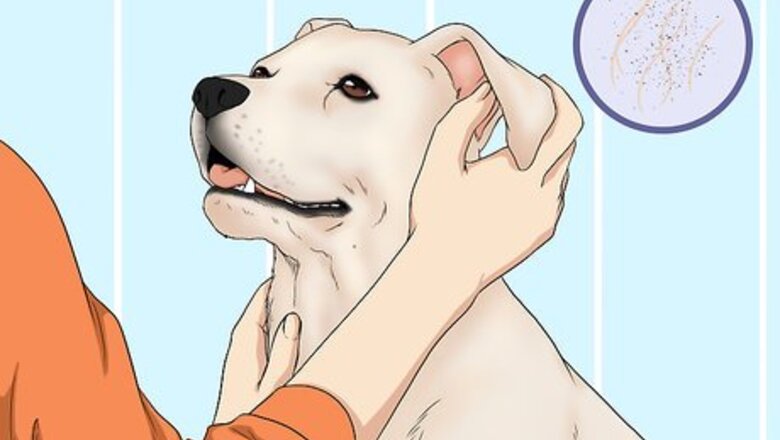
views
Removing Tangles and Loose Dirt
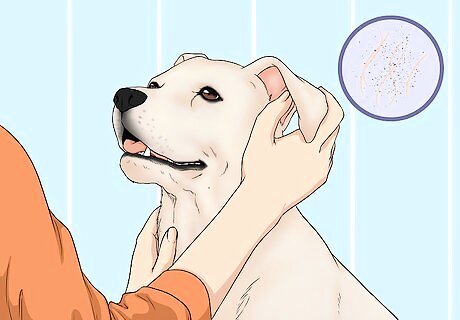
Remove any loose dirt or debris by hand before washing your dog’s face. Pull or brush any loose grass or other pieces of debris out of your dog’s facial hair with your fingertips. Check all areas of the dog’s head, neck, chin, and ears. This applies especially to long-haired breeds that are more prone to getting pieces of things stuck and tangled in their hair. Pay careful attention to your dog's lip folds. Since they're warm and moist, bacteria can grow there. It's important to keep these areas clean and dry. If your dog has heavy jowls or facial folds, part the wrinkles and furrows to make sure the skin is clean and free of infections.
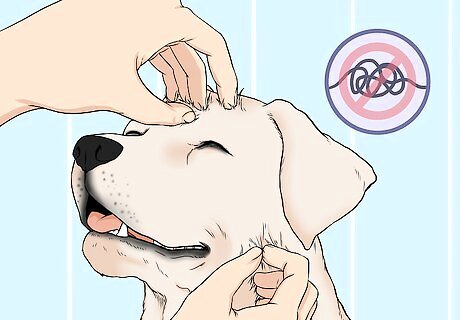
Use your fingers to remove any tangles from your dog’s face if it has long hair. Gently run your fingers through the tangles to part them. This will allow the water and shampoo to reach through your dog’s fur more easily.Tip: You can also try using a spray-on detangling agent to get mats out of your dog’s hair. If there are any matted areas that you can’t untangle, you might need to take your dog to a professional groomer to get them out.
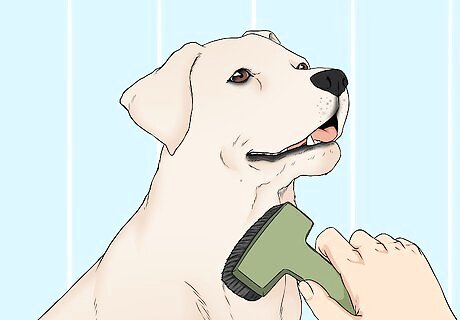
Brush your dog’s head and facial hair to make it easier to wash. Use a dog brush to gently brush the hair on your dog’s head, neck, chin, and ears. This will get out any remaining tangles and make it easier to wash your dog’s face and the surrounding areas. This isn’t necessary if your dog has very short hair that doesn’t get tangled or matted anywhere.
Washing Your Dog’s Face Fur
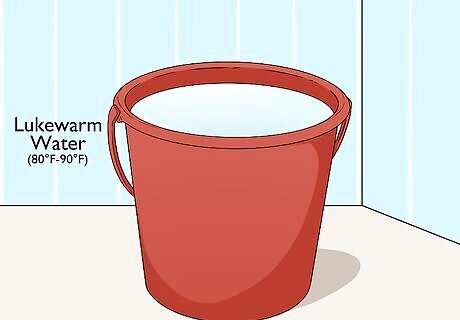
Use only lukewarm water to wash your dog’s face. Never use hot or cold water to wash any part of your dog. Fill a bowl with lukewarm water or set the temperature of the water in your shower to lukewarm. You can wash your dog’s face as part of a complete bath or separately. If you have a breed of dog with a wrinkly face, you need to clean its face daily to keep it healthy. You can get special canine wet wipes to make this easier. If your dog is prone to yeast infections, look for a wipe that contains chlorhexidine, which has antifungal and antibacterial properties. Additionally, dry the dog's face well after you wipe it.
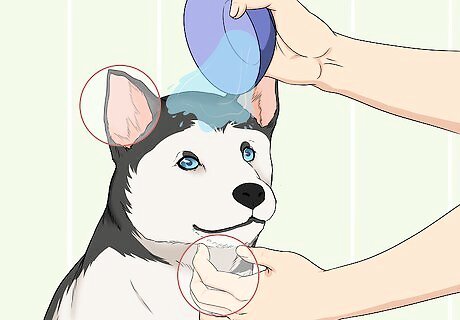
Rinse up to the dog’s chin and below the ears to dampen the facial fur. Use a shower head to gently spray or a bowl to gently pour water onto your dog’s fur. Lift the dog’s chin up in the air and dampen the chin fur, then dampen the fur on the back of the dog’s head from the ears down.Warning: Don’t ever spray a dog’s face with water directly. Always keep streams of water away from a dog’s eyes to avoid injury. You can use your hands to rub the water into the other areas of the dog’s facial fur. Just be careful not to get any water in the dog’s ears or eyes. Put cotton balls in your dog’s ears to keep water out if you aren’t confident you can direct the water away from them.
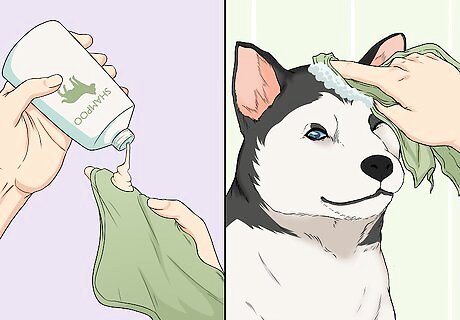
Massage dog shampoo into the dog’s facial fur with the corner of a wet cloth. Get a washcloth wet and pour out a bit of shampoo onto one corner of the cloth. Put your fingers in the cloth, behind the shampoo, and gently rub it into the fur around the dog’s head, neck, chin, and ears. If you don’t have dog shampoo, you can use another non-irritant shampoo, such as tearless baby shampoo. Don’t use regular human shampoo because it will dry out your dog’s skin. Since human skin has a different pH than dog skin, products made for humans will irritate a dog. You don’t have to use shampoo to wash your dog’s facial hair. If you want, you can just give it a thorough rinse to clean it.
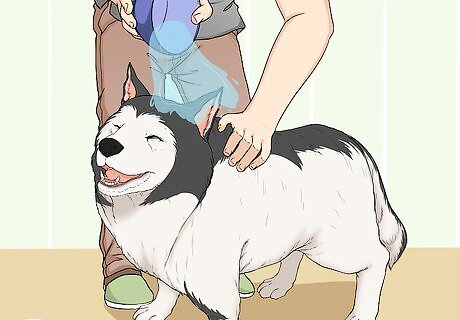
Rinse out all of the shampoo thoroughly. Gently pour or spray water down the back of your dog’s neck from just below the ears and down. Use a clean wet cloth to wipe away any shampoo from the more sensitive parts of the face like near the eyes and nose. Lift up the dog’s chin and rinse off the fur underneath its face. Continue to rinse until all of the suds are gone. If the dog’s face still has stains on it from dirt or grass after shampooing and rinsing it, gently massage shampoo into the areas again and rinse it out. If there are any stubborn stains that persist, such as from oil, then you might need to take your dog to a professional groomer to clean them.
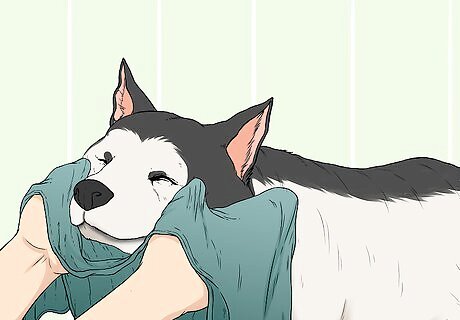
Let your dog’s face air dry. The air from a hair dryer is too hot for your dog’s skin, especially around its face. Just let your dog dry off naturally after you wash its face. If there is excess water in the fur around the dog’s face, you can gently pat it dry with a clean towel to keep it from running into the dog’s eyes or another sensitive area.
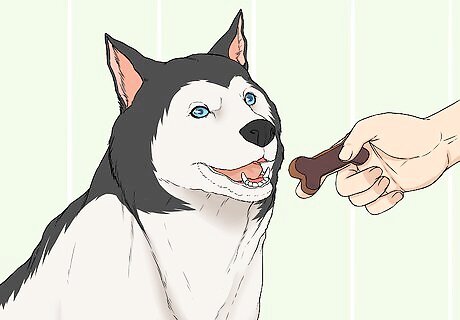
Reward your dog with a treat and lots of praise after washing its face. This will create a positive association for your dog with face cleaning. The dog will be more inclined to sit still and let you clean it’s face if it is expecting a treat and praise afterwards. If your dog really doesn’t like getting its face washed, start off slowly with a very short cleaning session followed by praise and a treat, then work your way up slowly until you can get through a full face washing. For example, you could just wash the dog’s chin, reward it with a treat, then the next time wash the chin and neck, followed by a treat, and so on.
Cleaning the Eyes and Outer Ears
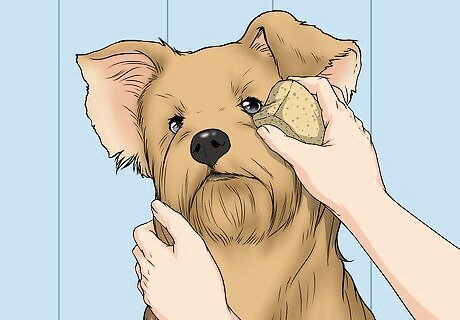
Clean around the dog’s eyes with a wet washcloth or sponge. Dampen the washcloth or sponge with room-temperature water and wring out excess water so it isn’t dripping. Carefully wipe around your dog’s eyes, applying gentle but firm pressure, and make several passes to dislodge any crusty bits around the eyes.Tip: You can also purchase special pre-moistened wipes that you can use for cleaning around your dog’s eyes and other parts of the face. Make sure to only use wipes designed for canines. If your dog has sore eyes or a possible eye infection, use separate cloths to wipe each eye. Don’t use paper towels or paper napkins to clean your dog’s eyes. These types of products can leave behind small bits of paper behind.
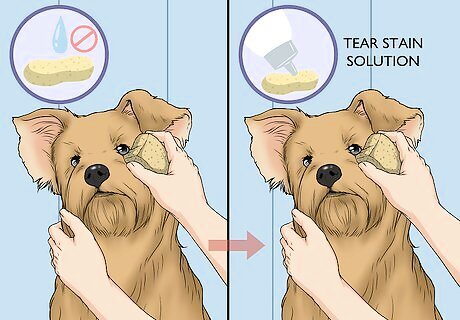
Use a special solution to clean tear stains if a wet washcloth doesn’t work. Certain breeds of dogs, such as poodles, can start to develop stains under the tear ducts of their eyes. Purchase a special solution at a pet store designed to clean this type of discoloration away from the eyes and follow the instructions for use. If this problem persists, then take your dog to a vet to be examined. In some cases it might be a sign of a problem with your dog’s tear ducts. To prevent stains, wipe away tears as soon as they appear. Prolonged exposure to the air oxidizes the tears and makes them stain your dog's face.
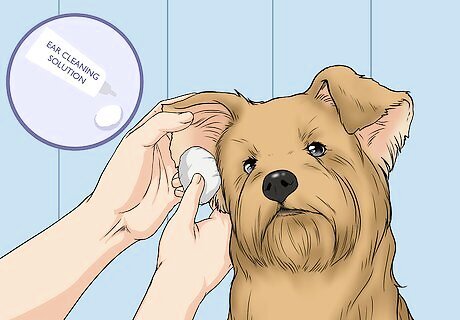
Wipe your dog’s ear flaps with a cotton ball soaked in ear cleaning solution. Get a canine ear cleaning solution from a pet store or a veterinarian. Soak a cotton ball in the solution, then carefully wipe the parts of the dog’s ears that you can see and reach. Don’t reach inside of the dog’s ears. Never use cotton swabs as you might accidentally poke them inside of your dog’s ears and hurt them.




















Comments
0 comment